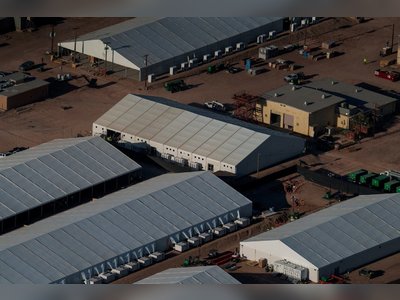Blackstone Is Building a $25 Billion Empire of Power-Hungry Data Centers
This is the oil of the future. Sites will be home to thousands of computers churning mountains of AI, data, powered by the energy needed for hundreds of thousands of homes.
Blackstone, a leading private equity firm, is making a significant foray into the world of data centers, with a projected investment that could reach 25 billion dollars.
This venture is not just ambitious in its financial scope but also in its physical scale and energy requirements.
In Phoenix, off a major highway, a massive construction project is underway.
Here, over an area larger than 60 football fields, Blackstone is building the first of five enormous data center buildings.
These structures, often referred to as "bunkers" due to their size and robustness, are designed to house a vast array of computers and servers.
About thirty miles away, there's another project, even more grand in scale.
Engineers are planning a data center complex on a 400-acre site, which is roughly three times larger than the Mall of America.
This development is transforming what was once agricultural land into a high-tech hub.
The primary function of these centers is to manage and process large volumes of data.
Data centers are critical infrastructure for the digital economy, hosting servers for websites, cloud computing resources, and storing huge amounts of data.
However, such facilities have significant energy demands.
The Phoenix projects alone, when completed, are expected to consume as much electricity as hundreds of thousands of homes.
This substantial energy requirement is primarily due to the need to power the servers and provide cooling to prevent overheating.
Blackstone's investment in these data centers is seen as a strategic move to capitalize on the burgeoning demand for data processing and storage, driven by the growth in cloud computing, streaming services, and the broader digital transformation of various industries.
The firm suggests that their investment in QTS, a leading data center landlord, could be one of their most profitable ventures yet, indicating the high potential they see in the data center market.
As these projects progress, they represent not just a financial investment but also an indication of the growing importance and resource intensity of the digital and especially AI infrastructure in our modern world.
This venture is not just ambitious in its financial scope but also in its physical scale and energy requirements.
In Phoenix, off a major highway, a massive construction project is underway.
Here, over an area larger than 60 football fields, Blackstone is building the first of five enormous data center buildings.
These structures, often referred to as "bunkers" due to their size and robustness, are designed to house a vast array of computers and servers.
About thirty miles away, there's another project, even more grand in scale.
Engineers are planning a data center complex on a 400-acre site, which is roughly three times larger than the Mall of America.
This development is transforming what was once agricultural land into a high-tech hub.
The primary function of these centers is to manage and process large volumes of data.
Data centers are critical infrastructure for the digital economy, hosting servers for websites, cloud computing resources, and storing huge amounts of data.
However, such facilities have significant energy demands.
The Phoenix projects alone, when completed, are expected to consume as much electricity as hundreds of thousands of homes.
This substantial energy requirement is primarily due to the need to power the servers and provide cooling to prevent overheating.
Blackstone's investment in these data centers is seen as a strategic move to capitalize on the burgeoning demand for data processing and storage, driven by the growth in cloud computing, streaming services, and the broader digital transformation of various industries.
The firm suggests that their investment in QTS, a leading data center landlord, could be one of their most profitable ventures yet, indicating the high potential they see in the data center market.
As these projects progress, they represent not just a financial investment but also an indication of the growing importance and resource intensity of the digital and especially AI infrastructure in our modern world.












